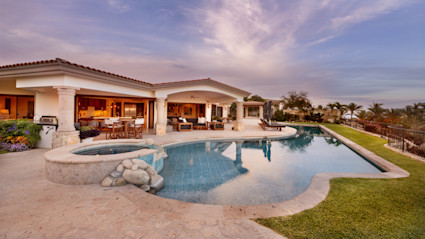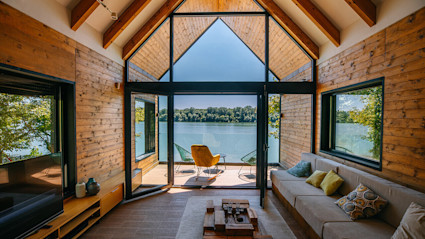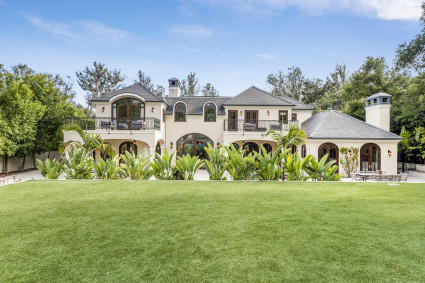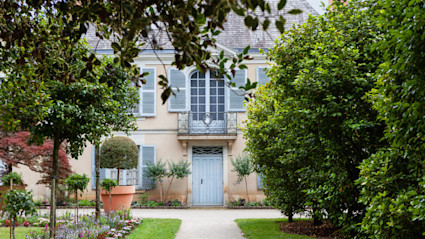1. Smaller homes are becoming more luxurious
Smaller homes continue to gain popularity among luxury buyers in 2025, and it's not just about saving money — it's a lifestyle choice. Recent data from the U.S. Census Bureau confirms this shift, with the average new home size dropping from 2,314 square feet in Q4 2022 to 2,169 square feet in Q4 2024. Affluent buyers are prioritizing convenience and financial flexibility, seeking homes that require less maintenance without sacrificing those high-end finishes we all love. Many buyers are choosing smaller homes because they're easier to purchase with cash, avoiding mortgage debt and those pesky rising interest rates.| Expert insight: "Downsizing is on many people's agenda in 2025 as more of the U.S. workforce reaches retirement age. Many of these individuals may be selling their luxury family homes, but they still want to reside in style." — Ryan Carrigan, CEO & Co-Founder of moveBuddha |
- Smart design makes spaces feel larger (full-height glass walls, minimalist built-ins).
- Premium finishes (Italian marble, reclaimed hardwood) elevate compact spaces.
- Financial flexibility allows for investment in vacation properties or other assets.
- Lower maintenance means more time for travel, leisure and personal pursuits.
2. The luxury market is stabilizing as inventory rises and price growth cools
After years of soaring prices and fierce competition, the luxury housing market is shifting toward a more balanced state in 2025. The extreme ups and downs we've seen in previous years are leveling off as more high-end properties become available. This increase in supply is giving buyers more options and cooling down the frenzy that once drove those intense bidding wars. In some areas, luxury home prices are even seeing slight declines — a welcome change for buyers.| In January 2025, the luxury real estate market had a 14.06% sales ratio, down dramatically from 37% in 2023. This shift moves the market closer to that sweet spot where neither buyers nor sellers have the upper hand. |
3. The luxury real estate market is becoming more globalized
Market trends in global luxury real estate are picking up steam in 2025, with more Americans considering international moves and foreign investors continuing to shape key U.S. markets. According to a recent survey, 40% of Americans have considered relocating abroad in the next two years, with 14% seriously contemplating it. Rachel Stringer, a real estate agent at Raleigh Realty, says, “Many are drawn to destinations offering better tax incentives, lower costs of living or a higher quality of life.” “Texas is seeing steady growth, especially in cities that offer business opportunities without the tax burdens of other states. California remains a desirable market for its prime coastal properties, even with the high entry price.” She added that Portugal and Spain are gaining traction among buyers looking for affordability and strong investment potential.At the same time, international luxury markets are evolving. A study by Knight Frank found that:- Dubai's prime real estate market will grow 5% in 2025, with listings in prime neighborhoods dropping 52% over the past year.
- Paris real estate is experiencing a renaissance, with prices projected to rise 2.5% as U.K. and U.S. buyers capitalize on a weaker euro.
- London's luxury market trends point to modest 2% growth in the short term, with stronger gains expected over the next five years.
4. Luxury price growth is slowing while select markets experience corrections
Luxury home prices in the U.S. continue to rise, but the pace of growth is slowing. According to Redfin, the median sale price of a luxury home reached a record $1,180,000 in Q2 2024 — an 8.8% increase year-over-year. Some markets are still seeing impressive gains, such as:- Providence, RI (16.5%)
- San Jose, CA (16.4%)
- Nassau County, NY (14.3%)
- New York (-3.2%)
- Austin, TX (-1.5%)
5. Cash is king, but financing is gaining traction in the luxury market
While cash has traditionally dominated luxury real estate transactions, financing is making a comeback as interest rates begin to descend.| Less than one-third of U.S. home purchases in 2024 were made with cash — a three-year low. |
6. Luxury buyers are adapting to evolving interest rates
With interest rates still on the high side, luxury buyers are proceeding with caution. Many are playing the waiting game, hoping for rates to drop before making their move.| A Coldwell Banker survey found that 35% of respondents have postponed buying due to rising interest rates. |
7. Luxury second-home market and co-ownership is booming
Even with economic challenges, the demand for luxury second homes is going strong in 2025. Buyers are flocking to coastal retreats, mountain hideaways and prestigious urban spots for both pleasure and investment. Real estate expert and Imperio Consulting CEO Eric Brown says, "Florida coastal locations remain popular for second home purchases, fueled by remote work and the search for year-round sunshine." Vacation towns are transforming into "workcation" destinations, allowing digital nomads to mix business with pleasure and get more bang for their buck.| According to a Coldwell Banker survey, growth in the luxury real estate market is outpacing the traditional real estate market by nearly 50%, highlighting the enduring appeal of second homes as versatile assets in 2025. |
| Benefits of luxury co-ownership models |
| Lower barrier to entry (1/8 to 1/2 ownership available) |
| Professional property management included |
| Reduced maintenance responsibilities and costs |
| Access to higher-quality properties at a fraction of full ownership cost |
| Built-in rental management for investment properties |
| Learn how co-ownership works with Pacaso |
8. Investors are expanding their portfolios with high-end real estate
Real estate investors are positioning for growth in 2025, focusing on expanding their portfolios and diversifying investments. There's growing interest in renovation projects, geographic expansion and different property types. Despite economic shifts, luxury real estate remains a stable and attractive asset. Investors are particularly eyeing luxury vacation rentals and emerging markets, seeking both appreciation and increased cash flow from high-end properties. Industry experts note that luxury real estate typically shows less volatility than other market segments, especially during uncertain economic times.Thomas Franklin, Founder and CEO at Swapped.com, offers a fascinating perspective: "Luxury real estate will operate more like private equity. Expect buyers to shift from full ownership to 'managed asset pools' where they control a portfolio of high-end properties worldwide. A New York penthouse for spring, a Tokyo condo for fall, a Swiss chalet for winter — fully optimized, fully leveraged." This shift toward managed asset pools lets investors spread their capital across multiple luxury properties, enjoying both flexibility and access to global markets while minimizing risk — a trend that's reshaping luxury real estate market trends in 2025.9. Smart homes are becoming essential rather than a luxury feature
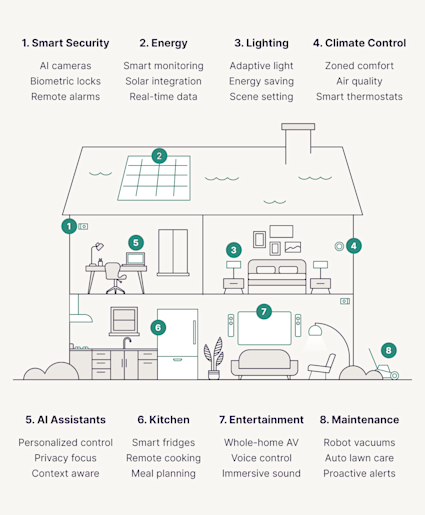
10. Luxury buyers are prioritizing sustainability
Sustainability is becoming a top priority for luxury buyers in 2025, with a growing emphasis on energy efficiency, eco-friendly materials and green spaces. As climate awareness rises and government regulations tighten, we're seeing a notable shift toward sustainable luxury real estate investments. Rachel Stringer puts it perfectly: "The conversation about sustainability has also shifted. It's not about marketing a home as eco-friendly for show — it's about efficiency. Solar panels, energy storage, water recycling and passive design are becoming standard because they lower long-term costs and increase self-sufficiency." Investing in green properties with luxury design offers both financial benefits and positive environmental impact. Sustainable features are increasingly in high demand among wealthy buyers looking for forward-thinking investments, making it one of the top luxury real estate market trends in 2025.| Top sustainable features in luxury homes |
| Solar panel systems with battery storage |
| Water recycling and conservation systems |
| Passive house design principles |
| Energy-efficient HVAC systems |
| Sustainable, locally sourced building materials |
| EV charging stations and infrastructure |
11. Luxury home buyers are prioritizing resiliency features
Luxury home buyers are increasingly looking for properties that can weather natural disasters — literally. In regions prone to hurricanes, wildfires and flooding — like California, New Orleans and Florida — buyers want more than just beautiful homes. They want properties with features that ensure their investments remain safe and functional no matter what Mother Nature throws their way. These features include:- Storm-proof roofing
- Solar panels
- Advanced water management systems
- Fire-resistant materials
12. Gen-X and Millennials will influence the market
Millennials and Gen-Xers are reshaping the luxury real estate market. Affluent millennials gravitate toward homes featuring cutting-edge technology, sustainability and energy efficiency, viewing real estate as a lifestyle statement and a financial investment. Their preference for urban properties or resort homes with income potential drives demand for smart, sustainable luxury properties across the market.Gen X buyers, now in their prime earning years, are focusing on long-term asset diversification. With wealth inherited from baby boomers, they're seeking homes with premium amenities, enduring value and stability for future generations. As Rachel Stringer notes, "Millennials and Gen X prioritize functionality, privacy and convenience. They want spaces designed for how they actually live — integrated wellness features, easy-to-maintain outdoor areas and turnkey properties." These generations are significantly influencing luxury real estate trends with their distinct preferences and priorities.Luxury real estate made easy with Pacaso
The luxury real estate market is always evolving, and 2025 promises to bring new opportunities and challenges for prospective buyers. Whether you're looking for a primary residence or a vacation property, our expert insights can help guide your decision-making process. To stay ahead of the latest luxury real estate market trends and discover exclusive high-end listings, Pacaso can help you cross the finish line on your vacation home ownership journey (or even help you figure out how to buy a second home without selling the first). Let us help you navigate the luxury real estate landscape and find the perfect property for your needs.Luxury real estate market FAQ
01: What is luxury real estate?
Luxury real estate is a term that varies depending on location and market conditions. Generally, it refers to properties that are significantly above the average price range and quality of other homes in the area.
02: How do you break into the luxury real estate market?
One way to break into the luxury home market is to search for real estate in a geographic location that meets your budget. For example, luxury real estate in Idaho is cheaper than luxury real estate in California.
03: Is it difficult to get into luxury real estate?
Getting into luxury real estate can be challenging, but not impossible. To succeed you need to have a solid understanding of market trends, the needs and preferences of affluent buyers and sellers, and the legal and financial aspects of high-end transactions.
04: Is luxury real estate a good investment?
Yes, luxury real estate can be a lucrative investment, especially when purchased in high-demand locations. These properties often appreciate over time and can offer significant returns through rental income or resale value. However, it's important to carefully assess market conditions, potential property maintenance costs and local demand to ensure a solid investment. As with any investment, diversification and long-term strategy are key to success.
05: How much does luxury real estate cost?
The cost of luxury real estate can vary widely depending on the property's location, size and unique features. In major metropolitan areas or prestigious locations, luxury homes can easily range from $1 million to tens of millions of dollars.
In more emerging markets, however, luxury properties may be priced more modestly, offering opportunities for buyers at a variety of price points. The definition of "luxury" can differ, but it’s typically characterized by premium quality and exclusivity.

